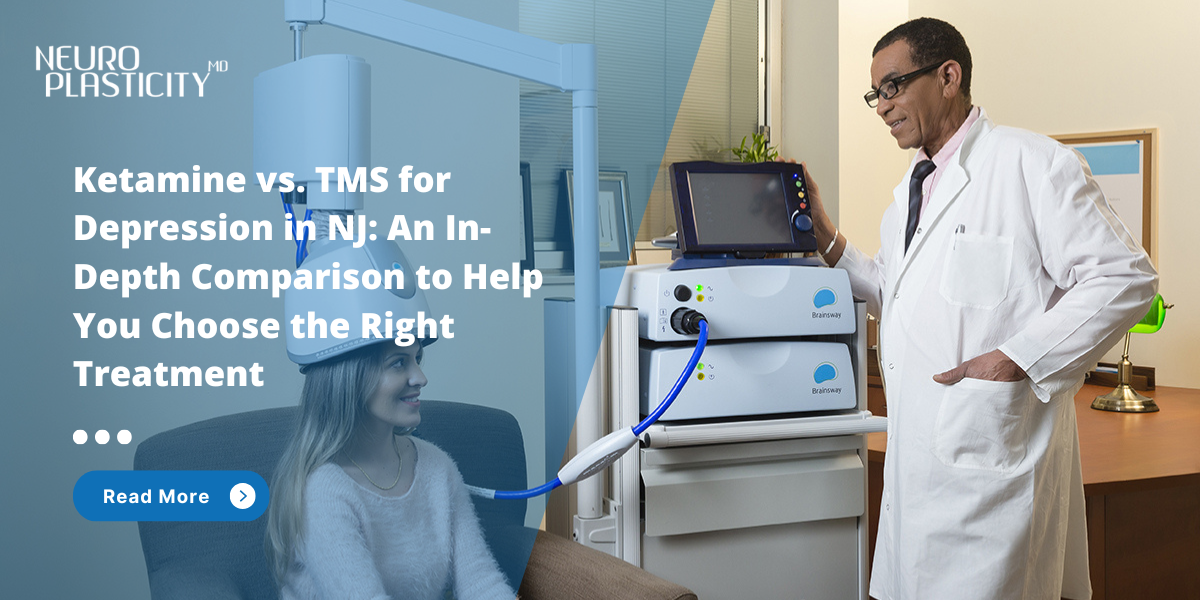Ketamine Treatment for Depression: Fast-Acting Relief & Expert Care For...
Continue Reading
For many individuals, traditional treatments for depression—such as antidepressants and talk therapy—don’t always bring the desired results. For those in New Jersey struggling with treatment-resistant depression, alternative approaches like Ketamine Treatment New Jersey and Transcranial Magnetic Stimulation (TMS) offer new hope. While both treatments have shown effectiveness, they differ significantly in how they work, their costs, duration of effects, and potential side effects. This guide explores the nuances of each treatment to help you make an informed decision about managing depression with TMS.
It works by targeting the brain’s glutamate system, which is responsible for synaptic plasticity, learning, and memory. By increasing the production of glutamate, ketamine encourages the brain to form new neural connections, often leading to rapid relief from depressive symptoms. This is especially helpful for those whose depression has proven resistant to more conventional treatments.
It is most commonly administered as an intravenous (IV) infusion. In some cases, however, nasal sprays (such as Spravato) are available, though these are less common and often come with additional considerations for safety and insurance.
A typical ketamine infusion session lasts around 45 minutes to an hour. Patients are monitored closely, as the drug’s effects can include mild dissociation or altered states of perception. Most patients undergo an initial series of 6 infusions over 2-3 weeks, followed by maintenance treatment for depression as needed.
TMS therapy utilizes magnetic pulses to stimulate areas of the brain associated with mood regulation, particularly the prefrontal cortex, which is often underactive in individuals with depression. This stimulation encourages the brain to “re-wire” itself in ways that alleviate depressive symptoms over time.
TMS is non-invasive and doesn’t involve anaesthesia or sedation. Patients remain awake and alert during sessions, with the TMS device placed on the head to target specific brain regions. Treatment of depression typically involves daily sessions (5 days a week) over the course of 4-6 weeks.
Each TMS session takes about 20-40 minutes, and patients can immediately resume daily activities afterward. Unlike ketamine, which has a fast onset of action, TMS results are more gradual, as the brain takes time to adjust to the repeated magnetic stimulation.
One of the key distinctions between ketamine and TMS is the timeline for relief. The effectiveness of Ketamine in Treating Depression often becomes evident after just one or two sessions, with many patients experiencing a noticeable reduction in depressive symptoms, sometimes within hours. In contrast, ketamine vs tms depression treatment requires consistent sessions over several weeks to achieve a cumulative effect, making it ideal for individuals who prefer gradual improvement.
Both ketamine and TMS treatments have demonstrated success in treating cases of depression that haven’t responded to traditional medications. Studies suggest that it has a success rate of about 70% for individuals with treatment-resistant depression, while TMS has shown similar success rates but over a longer period. Ketamine’s rapid action is often seen as beneficial for those with severe or urgent symptoms, whereas TMS’s long-term effects make it a sustainable option.
Some patients benefit from combining these therapies with traditional treatment resistant depression or even with each other. For instance, individuals may start with ketamine to stabilize symptoms quickly and then transition to TMS treatment session for long-term maintenance.
When it comes to choosing between ketamine and TMS, several factors play a critical role:
Choosing between ketamine and TMS for severe depression treatment in New Jersey is a highly individualized decision. Both options provide valuable relief for individuals with treatment-resistant depression, each with unique advantages. Ketamine offers fast-acting results, ideal for those needing immediate support, while TMS’s gradual, non-invasive approach appeals to those preferring a medication-free treatment. By consulting with mental health professionals and considering factors like insurance coverage, treatment goals, and potential side effects, NJ residents can make informed choices on their path to a brighter, healthier future.
Ketamine Treatment for Depression: Fast-Acting Relief & Expert Care For...
Continue ReadingA New Look At How Ketamine Treatment Can Help with...
Continue ReadingKetamine Migraine Treatment: A Breakthrough in Lasting Migraine Relief Ketamine...
Continue ReadingDisclaimer: The medical information on this site is provided as an information resource only, and is not to be used or relied on for any diagnostic or treatment purposes. This information is not intended to be patient education, does not create any patient-physician relationship, and should not be used as a substitute for professional diagnosis and treatment. Always consult your healthcare provider before making any healthcare decisions or for guidance about a specific medical condition.